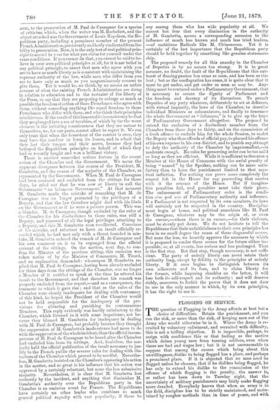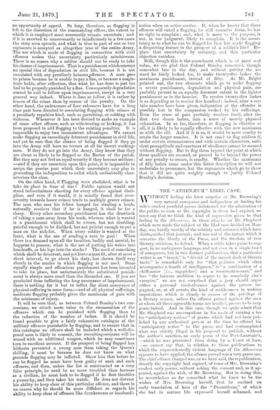FLOGGING ON SERVICE.
THE question of Flogging in the Army affords at best but a choice of difficulties. Retain the punishment, and you run the risk, or more than the risk, of keeping men out of the Army who would otherwise be in it. Where the Army is re- cruited by voluntary enlistment, and recruited with difficulty, this is not a trifling objection. It is impossible, perhaps, to assign with confidence this or that feeling as the motive which deters young men from turning soldiers, even when times are bad and wages low ; but it is not unreasonable to suppose that among the causes which bring about this unwillingness, dislike to being flogged has a place, and perhaps a prominent place. If it is objected that no man need be flogged unless he chooses, that if he dislikes being flogged, he has only to extend his dislike to the commission of the offence of which flogging is the penalty, the answer is, or rather has been down to Tuesday night, that the uncertainty of military punishments may fairly make flogging more dreaded. Everybody knows that when an army is in the field, discipline has to be strictly maintained, and main- tained by rougher methods than in time of peace, and with
no opportunity of appeal. So long, therefore, as flogging is left to the discretion of the commanding officer, the extent to which it is employed must necessarily remain uncertain ; and if it is resorted to unnecessarily or injudiciously in a few cases the story soon spreads, and what is true in part of one or two regiments is accepted as altogether true of the entire Army. The use which is made of flogging in connection with civil offences makes this uncertainty particularly mischievous. There is no reason why a soldier should not be ready to take his chance of imprisonment. That is a punishment which conveys no special idea of degradation in civil life, because it is not associated with any peculiarly heinous.offences. A man goes to prison because he is unable to pay a fine, or because a magis- trate holds, after reflection, that what he has done is just too bad to be properly punished by a fine. Consequently degradation cannot be said to follow upon imprisonment, except in a very general way indeed. Where it does so follow, it is rather by reason of the crime than by reason of the penalty. On the other hand, the endeavours of Law reformers have for a long time past been directed to associating flogging with crimes of a peculiarly repulsive kind, such as garrotting, or robbing with violence. Whenever it has been desired to make an example of some other offence, such as wife-beating or kicking, it has been proposed to add flogging to the existing penalties. It is impossible to enjoy two inconsistent advantages. We cannot make flogging an exceedingly deterrent punishment in civil life, and yet be sure that the chance of being flogged if they go into the Army will have no terrors at all for decent working- men. If they do not go into the Army, they know that they are about as likely to be flogged as the Rector of the parish. But they may not feel an equal security if they become soldiers ; —and if they are uncertain upon this point, it is impossible to assign the precise part which their uncertainty may play in generating the indisposition to enlist which undoubtedly char- acterises the class.
On the other hand, if Flogging were abolished, what is to take its place in time of war ? Public opinion would not stand indiscriminate shooting for every offence against disci- pline, and even if it would, it is usually found that over- severity towards lesser crimes tends to multiply graver crimes. The man who sees his fellow hanged for stealing a lamb, naturally resolves that if he is hanged, it shall be for a sheep. Every other secondary punishment has the drawback of taking a man away from his work, whereas what is wanted is a punishment which shall be severe, but not disabling, painful enough to be disliked, but not painful enough to put a man on the sick-list. When every soldier is wanted at the front, what is the use of sending a man to gaol ? When there is a demand upon all the faculties, bodily and mental, he happens to possess, what is the use of putting his wrists into handcuffs, or his legs into the stocks ? The need of something which shall be deterrent, and yet leave a man fit, after at most a short interval, to go about his duty, has shown itself very clearly in the armies in which flogging is not used. Some equally simple and efficacious punishment has been invented to take its place, but unfortunately the substituted punish- ment is always more cruel than the discarded one. If you are precluded from inflicting the long annoyance of imprisonment, there is nothing for it but to inflict the short annoyance of physical suffering in some form,—and of all physical sufferings, moderate flogging probably gives the maximum of pain with the minimum of injury.
It will be seen that, as between Colonel Stanley's two con- cessions, we attach more value to the enumeration of the offences which can be punished with flogging than to the reduction of the number of lashes. If it should be found possible to give a fairly exhaustive catalogue of the military offences punishable by flogging, and to ensure that in this catalogue no offence shall be included which a well-dis- posed man is likely to commit, the recruiting-serjeant will be armed with an additional weapon, which he may sometimes turn to excellent account. If the prospect of being flogged has hitherto prevented a young man from taking the Queen's shilling, it must be because he does not know on what grounds flogging may be inflicted. Show him that before he can be flogged he must have been guilty of such and such offences, and then, unless the list is constructed on a very false principle, he need be no more troubled than because as a civilian, he must look to be flogged if he first throttles a passer-by, and then takes his watch. He does not distrust his ability to keep clear of this particular offence, and there is no reason why he should be more diffident as regards his ability to keep clear of offences like drunkenness or insubordi-
nation when on active service. If, when he knows that these offences will entail a flogging, he still commits them, he has no right to complain ; and, what is more to the purpose, is not, in our judgment, likely to complain. It is the uncer- tainty as to what he can be flogged for that has made flogging a disquieting feature in the prospect of a soldier's life ? Re- place that uncertainty by certainty, and this particular objection vanishes.
Still, though this is the amendment which is of most real value, we are glad that Colonel Stanley consented, though somewhat late in the day, and without getting the re- ward he fairly looked for, to make twenty-five lashes the maximum punishment, instead of fifty. As Mr. Bright pointed out, the two elements which go to make flogging a severe punishment, degradation and physical pain, are probably present to an equally deterrent extent in the lighter punishment as in the heavier. To receive twenty-five lashes is as degrading as to receive five hundred ; indeed, after a cer- tain number have been given, indignation at the offender is possibly lost in the compassion evoked by his sufferings. Even the sense of pain probably resolves itself, after the first two dozen lashes, into a sense of merely physical exhaustion. In so far, therefore, as flogging is effective at all, it is likely to be equally effective with the new maximum as with the old. And if it is so, it would be mere cruelty to retain the larger number. It is not cruel to flog soldiers if, under certain circumstances and with certain characters, suffi- cient promptitude and exactness of obedience cannot be secured without flogging. But to flog them beyond the point at which these qualities are secured, or proved to be beyond the power of any penalty to secure, is cruelty. Whether the maximum of fifty lashes came under this latter description we will not undertake to pronounce, but the arguments which go to show that it did are quite weighty enough to justify Colonel Stanley's decision.



































 Previous page
Previous page